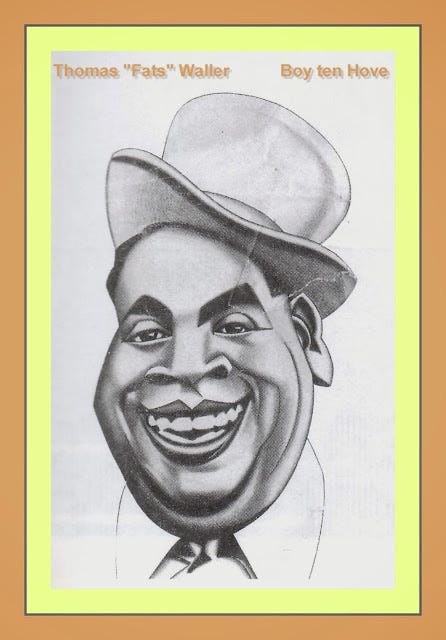Thomas "Fats" Waller - 1904-1943
© -Steven Cerra, copyright protected; all rights reserved.
"My father [Fats Waller] had a unique system to reward inventiveness in improvisation. Pop kept two bottles of gin on a table during the rehearsals. One bottle was for himself... The other bottle was the 'encourager,' as he called it. When one of the band excelled in an improvisational section, Dad would stop the rehearsal, pour him a healthy shot of gin, and the two of them would toast each other."
- Maurice Waller
“Both Fats Waller and his principal tutor, James P. Johnson, lived lives of aching frustration. Johnson ached openly because he could find no audience for his serious compositions, but Waller's desire to find acceptance as a serious musician was buried under a heavy coating of pervasive geniality. And while Johnson plodded steadily downhill in puzzled despair, Waller's blithely ironical attitude carried him up and up and up in the material world — eventually to a level that even his enormous energy could not cope with.
He was one of the most massively talented men who has ever turned up in the world of popular music — an inimitable entertainer whose charm has, if anything, grown in the nostalgic decade and a half since his death; the writer of some of the great evergreen songs in the popular repertoire ("Honeysuckle Rose," "Ain't Misbehavin'"); a jazz pianist whose playing was a landmark in the development of that instrument and whose influence on pre-bop pianists was surpassed only by that of Earl Hines; and a section man who could swing an entire band as no one else could.
All of these gifts were his and yet, like the inevitable clown who wants to play Hamlet, he had a consuming desire to bring to the public his love of classical music and of the organ. His need to offer this gift and have it accepted was almost childlike and, childlike, the hurt when it was rejected was deep and long.”
- John S. Wilson, Jazz critic, New York Times
I never knew what to make of Fats Waller. His music happened way before my time and I could not seem to reconcile the views some held of him as little more than a musical buffoon with those that labeled him a keyboard stylist and composer of the first order.
In attempting to make up my own mind about his music, part of the problem was that most of what I had access to was derivative, in other words, what other Jazz musicians had to say on Fats’ Ain’t Misbehavin’, Honeysuckle Rose [upon which Charlie Parker’s Scrapple from the Apple is based], Squeeze Me, The Jitterbug Waltz and Black and Blue.
It really wasn’t until the reissue mania associated with the advent of the compact disc in the 1980’s that I had the opportunity to sit down and listen to the collected works of Fats which helped me finally understand what the fuss had been all about concerning his playing and his music.
One of the great joys of recorded Jazz is being able to go back in time and listen to the music of the Jazz masters of yesteryear.
Keep reading with a 7-day free trial
Subscribe to CerraJazz Substack to keep reading this post and get 7 days of free access to the full post archives.




